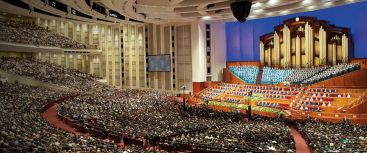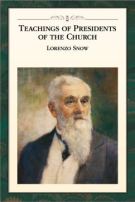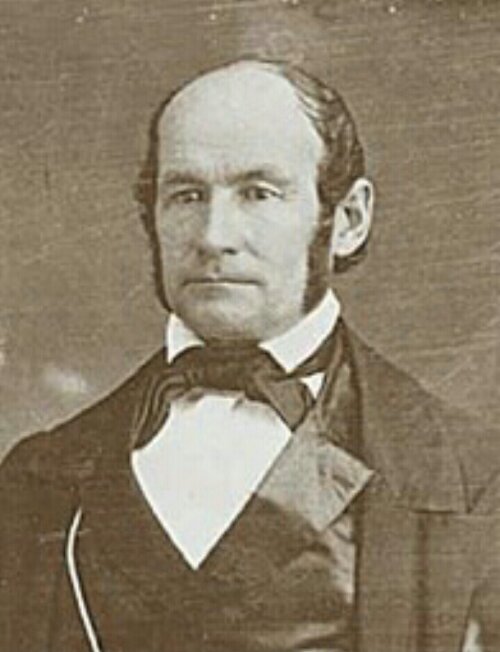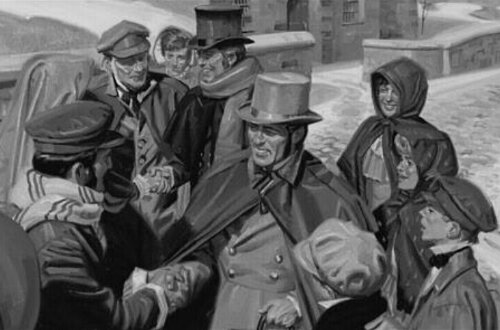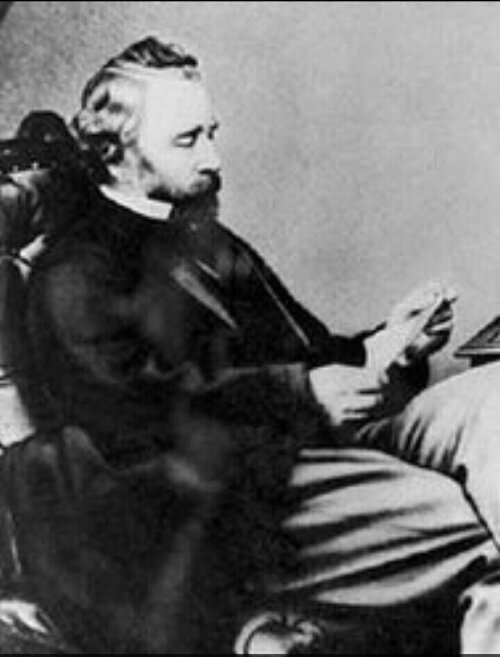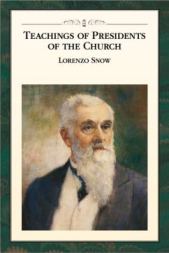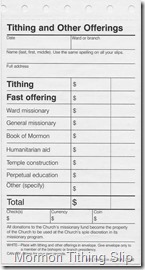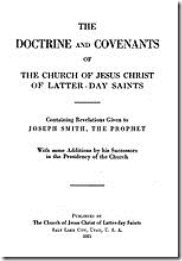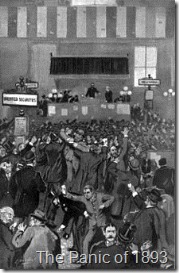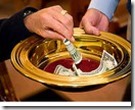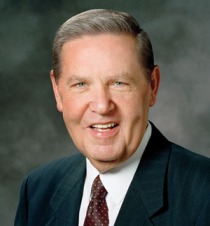
An ongoing series of articles on some common and recurring weak arguments that Christians make against Mormonism.
by Fred W. Anson
The Argument:
“The Bible says that my sectarian, partisan, non-essential doctrine is the only true truth!”
First A Little Background:
A few years ago I was listening to the audio recordings from a conference that was held in Utah to educate Christians on the differences between Mormonism and Evangelical Christianity. The vast majority of the presentations were given in a non-partisan manner that any Christian – even non-Evangelical Christians – could agree with. That’s because they focused solely on the essential doctrines of the Christian faith or simply on the actual text of the Bible itself.
But then there was this one . . .
While the conference was non-denominational and featured speakers from a number of groups, it was held at a Calvary Chapel. One of the speakers (the wife in a husband and wife team who were members of the host church) gave a presentation that, frankly, had me grinding my teeth. That’s because she would first give the Mormon position on something, then say, “But the Bible says . . . ” and proceed to spew pure Calvary Chapel dogma and jargon (most notably on eschatology and demonology) as if it were absolutely and universally held to by all Christians in the way that she was articulating it.
By the end of the presentation, I was so frustrated by such overt “in yer face” bias that whenever she said, “But the Bible says . . . ” I would just talk over her voice on the recording with my own, “But Calvary Chapel says . . . ”
Now on the essential doctrines of the Christian faith there’s clearly no “wiggle room”. In their case, please dear reader, by all means, say “The Bible says” all you like – I do. However, on the non-essentials isn’t it better to preface our statements with a more gracious and qualified, “As I understand it the Bible says” or “To me the Bible says”? If that dear but sincerely misguided sister had done so, I would have had no issues with her presentation and wouldn’t be using it as an illustration of how not to do it.
Why It’s Weak:
1) It needlessly buries the essential doctrines of Christianity underneath a pile of non-essentials.
Here’s a question for my fellow Christian readers: Do you know what the essential doctrines of the Christian faith are? Do you know what the non-essentials are? If you were asked to do so could you list them? Please don’t feel embarrassed or ashamed if the answer to any or all of these questions is no – I didn’t have a good grasp on them when I entered Mormon Studies. But boy, oh boy, did I learn them, and learn them fast – I had to in order to survive in this rough and tumble world where acrimony too often reigns supreme!
What was most helpful to me was Theologian Matt Slick’s primer on the subject where he explains:
The Bible itself reveals those doctrines that are essential to the Christian faith. They are 1) the Deity of Christ, 2) Salvation by Grace, 3) Resurrection of Christ, 4) the gospel, and 5) monotheism. These are the doctrines the Bible says are necessary. Though there are many other important doctrines, these five are the ones that are declared by Scripture to be essential. [1]

Once again for emphasis, the essential doctrines of the Christian faith are as follows:
The Essential Doctrines of the Christian Faith
1) The Deity of Jesus Christ.
2) Salvation by Grace.
3) The resurrection of Jesus Christ.
4) The gospel of Jesus Christ, and
5) Monotheism.
On these issues there is – and always has been – unity among Christians. Simply put if you’re not aligned with these Biblical essentials you and/or your group isn’t aligned with orthodox, mainstream, Biblical Christianity. As Mr. Slick goes on to explain, “A non-regenerate person (i.e., Mormon or Jehovah’s Witness, atheist, Muslim), will deny one or more of these essential doctrines. Please note that there are other derivative doctrines of scripture that become necessary also and the Trinity being one.”[2]
Everything else is non-essential. As theologian C. Michael Patton’s chart illustrates (see Figure A above) that’s not to say that the non-essentials are unimportant, it’s just to say that the Bible is silent, ambiguous, or unclear on them – or that they’re not essential for salvation. Therefore, there’s “wiggle room” on them. We’re talking about things like:
- Eschatology (how and when the end times will unfold, the rapture, the millenium, the role of Israel today, etc.)
- Earth Age (young v. old earth creationism, etc.)
- Bible translation preferences (King James v. modern translations, word-for-word v. thought-for-thought, etc.)
- Ecclesiology (church government models, the roles of clergy and laity, are Apostles and Prophets for today, etc.)
- Soteriological Systems (Arminianism v. Calvinism, etc.)
- Demonology (can a Christian have a demon or not, teachings on various kinds of spiritual warfare, etc.)
- Sacrament practices (wine v. grape juice, leavened v. unleavened bread, who can administer, etc.)
- Modes of baptism (sprinkling v. full immersion, infant baptism, etc.)
- Worship styles (liturgical v. contemporary, hymns v. choruses, choirs, drums v. organs, etc.)
- The gifts of the Holy Spirit (tongues v. no tongues, cessationism v. continuationism, etc.)
- Worship observances (Sabbatarianism v. Sunday worship, observance of special holy days, etc.)
- Food and drink (consumption of alcohol v. abstinence, kosher v. non-kosher food, etc.)
- Various do’s and don’ts (tobacco consumption, playing cards, dancing, makeup, “acceptable” dress, movies, etc.)
- Etc., etc., etc. This is far from an exhaustive or comprehensive list of Christian non-essentials – it seems endless at times!
On these issues there’s liberty. Christians can and will have legitimate differences of opinion and beliefs on them. Thus for modern Christians, the words of 17th century Theologian Rupertus Meldenius still ring true today:
“In essentials, unity;
In non-essentials, liberty;
In all things, charity.
Or as Christian Theologian C. Michael Patton explains, “I often tell people that there are some things which I believe that I would die for; there are some things which I believe that I would lose an arm for; there are some things which I believe that I would lose a finger for; and then there are some things which I believe that I would not even get a manicure for.”[3]
2) It takes the focus off of the essentials.
Mormon Researcher Bill McKeever has a a great saying, “The gospel is offensive enough – let’s make sure we offend Mormons with what really matters!” Arguing from dogma, preferences, and non-essential doctrine dilutes the message to Mormons that really matters, specifically:
1) Mormonism teaches another Jesus. Jesus Christ wasn’t the procreated son of God. He’s not an exalted man who acheived deification. He is, and always has been, God eternal. (The Deity of Jesus Christ)
2) Mormonism teaches another salvation – specifically that additional works (baptism into a church, temple ordinances, temple marriage, etc.) are all required for full salvation. Rather, the Bible teaches repeatedly that we are saved by grace through faith in the atoning work of Christ on the cross, plus nothing. (Salvation by Grace)
3) Mormonism gets Christ’s resurrection mostly right but is still wrong. Thank you our Mormon friends for getting the resurrection of Jesus Christ mostly right! However, the teaching that Jesus by his resurrection assures immortality in some heavenly kingdom for virtually everyone not isn’t biblical, it’s universalist heresy. (The resurrection of Jesus Christ)[4]
4) Mormonism teaches another gospel. Paul told us plainly what the gospel is: “Now, brothers, I want to remind you of the gospel I preached to you, which you received and on which you have taken your stand. By this gospel you are saved, if you hold firmly to the word I preached to you. Otherwise, you have believed in vain. For what I received I passed on to you as of first importance: that Christ died for our sins according to the Scriptures, that he was buried, that he was raised on the third day according to the Scriptures,”[5] Mormonism requires works in addition to Christ’s atonement (by making observance of laws and ordinances a salvific issue) thus nullifying God’s grace and putting Mormons back under the law. (The gospel of Jesus Christ)
5) Mormonism teaches a form of henotheistic idolatry. The Bible is clear from cover-to-cover that there is one – and only one – eternal being known as God who consists of three co-equal, co-eternal persons. The Bible does not teach that there is a plurality of gods, be they exalted, deified men or otherwise. In fact, the Bible repeatedly denounces such teaching. (Monotheism)
6) Mormonism follows a false prophet. And of course, since all the errant, unbiblical, and heretical doctrines above were introduced to the world by Joseph Smith, the Christian message to Mormonism has also first and foremost always been: You’re following a false prophet! While that’s not directly tied to the essentials of the Christian faith it’s still an important Biblical distinctive[6] and has always been at the core of Christian arguments against Mormonism.
3) Making non-essentials essential is a very Mormon thing to do.
Stop for a moment and consider this: Mormonism specializes in making molehills into mountains and non-essentials into essentials. There’s a reason for this: Because systematic theology is impossible in Mormonism, it’s also impossible to distinguish essential doctrines from non-essential doctrines.[7]
To cite just one of many examples let’s consider baptism. Mormonism is absolute in its belief that getting baptized in the right way, with the right words, by the right person, into the right church is essential for salvation. Consider this from the official LdS Church website:
Baptism by immersion in water by one having authority is the first saving ordinance of the gospel and is necessary for an individual to become a member of The Church of Jesus Christ of Latter-day Saints and to receive eternal salvation. All who seek eternal life must follow the example of the Savior by being baptized and receiving the gift of the Holy Ghost.[8]
In fact, baptism is so critically important in Mormon soteriology that Latter-day Saints make proxy baptism for dead folks (that is, the ones who got it “wrong” while they were alive) a major focus and priority. They consume countless hours and expend untold resources in this effort. Just notice how in the following excerpt from the LdS Church website the criticality of proper baptism for the dead is dogmatically stressed:
Jesus Christ taught that baptism is essential to the salvation of all who have lived on earth (see John 3:5). Many people, however, have died without being baptized. Others were baptized without proper authority. Because God is merciful, He has prepared a way for all people to receive the blessings of baptism. By performing proxy baptisms in behalf of those who have died, Church members offer these blessings to deceased ancestors. Individuals can then choose to accept or reject what has been done in their behalf.[9]
Yet, when one considers the Biblical record, baptism isn’t nearly as cut and dry – or even as vital – as Mormon doctrine makes it:
Requiring anything in addition to faith in Jesus Christ for salvation is a works-based salvation. To add anything to the gospel is to say that Jesus’ death on the cross was not sufficient to purchase our salvation. To say that baptism is necessary for salvation is to say we must add our own good works and obedience to Christ’s death in order to make it sufficient for salvation. Jesus’ death alone paid for our sins (Romans 5:8; 2 Corinthians 5:21). Jesus’ payment for our sins is appropriated to our “account” by faith alone (John 3:16; Acts 16:31; Ephesians 2:8-9). Therefore, baptism is an important step of obedience after salvation but cannot be a requirement for salvation.
Yes, there are some verses that seem to indicate baptism as a requirement for salvation. However, since the Bible so clearly tells us that salvation is received by faith alone (John 3:16; Ephesians 2:8-9; Titus 3:5), there must be a different interpretation of those verses. Scripture does not contradict Scripture. In Bible times, a person who converted from one religion to another was often baptized to identify conversion. Baptism was the means of making a decision public. Those who refused to be baptized were saying they did not truly believe. So, in the minds of the apostles and early disciples, the idea of an un-baptized believer was unheard of. When a person claimed to believe in Christ, yet was ashamed to proclaim his faith in public, it indicated that he did not have true faith.[10]
Trust me, I have very strong opinions on baptism – how it should be done, when it should be done, etc. – and I’m pretty darn certain in my little mind that they’re utterly biblical and totally legitimate. However, I still qualify them as my opinion as such when dealing with Mormons because I understand that other Christians can have equally biblical, equally legitimate positions on baptism. After all, I would much rather have them focusing on what really matters rather than whether someone should be dunked, sprinkled, or doused after they’ve accepted the gospel and made the decision to follow Jesus – wouldn’t you?
4) The argument unravels when and if it’s challenged by Christians who hold to equally valid positions.
This has happened to us all hasn’t it? On more than one occasion when presenting an argument to a Mormon I’ve glossed poetic giving the logic, reason, and language of my church’s views on a particular non-essential of the faith. I’ve uttered the very words that gets the congregation nodding their heads in agreement and giving a hardy “Amen!” in our church. I’ve been articulate. I’ve been clever. I’ve been witty. I’ve been wise. And I’ve rested my case and sat back down smug and self-satisfied only to have some “loser” from another church or group say, “Really? Well what about . . . ?” and then proceed to present evidence that demonstrates that’s there’s more than one valid view on the matter. And so there I’ll sit, frowning with egg on my face while I watch while my beautiful and glorious “watertight” argument springs a leak right before my eyes (not to mention a worldwide audience). Yes folks, if humbling experiences build character then I must have a lot of character by now!
 In the end, and to paraphrase and abuse an oft quoted Mormon colloquialism, “When your pastor has spoken all the thinking hasn’t been done!” I know you love your pastor – I love mine too; I know you love your church – I love mine too, and; I know you think you’re absolutely, positively right in your theology – so do I. But the fact remains that on the non-essentials there are a lot of good, thoughtful, valid positions out there. Getting too dogmatic on them will only get you in trouble in the marketplace of ideas and make you unpleasant to be around. If you do it too much, you’ll simply be ignored. And like I said, that egg on the face thing has happened to us all hasn’t it? So, perhaps when it comes to the non-essentials we would all do well to “curb our dogma”.
In the end, and to paraphrase and abuse an oft quoted Mormon colloquialism, “When your pastor has spoken all the thinking hasn’t been done!” I know you love your pastor – I love mine too; I know you love your church – I love mine too, and; I know you think you’re absolutely, positively right in your theology – so do I. But the fact remains that on the non-essentials there are a lot of good, thoughtful, valid positions out there. Getting too dogmatic on them will only get you in trouble in the marketplace of ideas and make you unpleasant to be around. If you do it too much, you’ll simply be ignored. And like I said, that egg on the face thing has happened to us all hasn’t it? So, perhaps when it comes to the non-essentials we would all do well to “curb our dogma”.
5) It reinforces the Mormon Great Apostasy dogma.
Most Mormons think and the LdS Church teaches that all Christians church other than theirs are a big ball of confusion. Consider this from the official LdS Church website:
During the Great Apostasy, people were without divine direction from living prophets. Many churches were established, but they did not have priesthood power to lead people to the true knowledge of God the Father and Jesus Christ.[11]
Public bickering in front of Mormon just validates and reinforces this stereotype and prejudice.
Further, watching Christians do their “in house” debating over non-essentials on Mormon discussion boards is what some (manipulative) Mormons live for. I’m an administrator on several Mormon themed discussion boards and I have seen more than one Mormon deliberately bait the Calvinists to get them arguing with the Arminians (or vice versa) simply so they can sit back and watch the Christian fur flying and get the heat off of the errors of Mormonism. They love it because the spatting, hair pulling, caterwauling cat fight the Christians are giving to a worldwide audience is something that they can point to and (incorrectly) say, “See what I mean? Mormons never bicker like this! We have a living prophet to guide us! We have unity, peace, and serenity in our church! We’re homogenized and boring – and we love it that way!”
The Stronger Arguments:
Normally at this point in the articles in this series we provide a series of suggested arguments to use instead of the weak argument that was originally presented. However, this article is really more of an introduction to an overall problem that we see in weak arguments that Christians regularly make – just go onto a Mormon themed discussion board on Facebook after you’re done reading this and within minutes you’ll see what I mean.
Coming articles will echo this article in that we will present some common weak arguments that we’ve seen regularly that fall into the general category of arguing dogmatically over non-essentials.
That said, it should also be said that strong arguments against Mormonism are always rooted and grounded firmly in the essentials of the Christian faith. Specifically, strong arguments will always be some variation on the themes we introduced earlier in this article:
1) Mormonism teaches another Jesus.
2) Mormonism teaches another salvation.
3) Mormonism gets Christ’s resurrection mostly right but is still wrong.
4) Mormonism teaches another gospel.
5) Mormonism teaches polytheism.
6) Mormonism follows a false prophet.
Like the notes in a musical theme these six points can be woven into a seemingly endless array of strong, persuasive arguments. Use them skillfully and creatively and your arguments against Mormonism will be as moving as a Mozart symphony. But if you deviate too far from them, we’re talking Spike Jones.
NOTES
[1] Matt Slick, “Essential Doctrines of Christianity”, CARM website. While Mr. Slick’s article is an excellent short vernacular primer, C. Michael Patton’s “Essentials and Non-Essentials in a Nutshell” article is the better resource for those seeking a fuller, more nuanced understanding of the subject. Finally for those who find Mr. Slick’s outline format a bit too cryptic and Mr. Patton’s article too long should consider the short but insightful “What are the essentials of the Christian faith?” article on the “Got Questions?” website instead.
[3] C. Michael Patton, “Essentials and Non-Essentials in a Nutshell”, Credo House website
[4] Yes, Mormonism gets this one mostly right – let’s give some credit where credit is due. Never-the-less, Theologian Rob Bowman of the Institute for Religious Research (IRR) explains how and why Mormonism still manages to get the resurrection of Christ wrong:
According to the LDS Church, Jesus’ death and resurrection guarantees resurrection to immortal life for practically everybody—Christian or not, moral or not—in one of three heavenly kingdoms. (The only exception are the “sons of perdition,” incorrigibly evil people that include some ex-Mormons.) We cannot discuss the three Mormon heavenly kingdoms here, but the Bible is clear that the wicked will be resurrected only to face, in their bodies, their condemnation to eternal punishment (Dan. 12:2; Matt. 10:28; 25:46; John 5:28-29; Acts 24:15). They derive no benefit from Christ’s atoning death. Only the righteous “in Christ”—those who belong to Christ—will be made alive and given immortality (1 Cor. 15:22-23, 53-54).
Finally, although the LDS Church affirms that Jesus ascended bodily into Heaven and will return bodily to the earth one day, it wrongly claims that Jesus has visited the earth bodily on other occasions between his ascension and second coming. The Book of Mormon claims that Jesus visited the Nephites in the Americas several separate times, destroyed whole cities of the wicked, preached to the righteous, and formed a church for them. In the First Vision story, Joseph Smith claimed that Jesus (and God the Father!) appeared personally to him to instruct him to join none of the existing churches. These LDS claims may seem innocent enough, but their significance is that they call into question the sufficiency and, ultimately, the reliability of the New Testament revelations of Jesus Christ.
(Rob Bowman, “The Mormon View of Jesus Christ: The Bottom-Line Guide to Mormonism, Part 5”, IRR website article)
[5] 1 Corinthians 15:1-4 (New International Version)
[6] Please consider Deuteronomy 13:1-5 in light of this which says:
If there arises among you a prophet or a dreamer of dreams, and he gives you a sign or a wonder, and the sign or the wonder comes to pass, of which he spoke to you, saying, ‘Let us go after other gods’—which you have not known—‘and let us serve them,’ you shall not listen to the words of that prophet or that dreamer of dreams, for the Lord your God is testing you to know whether you love the Lord your God with all your heart and with all your soul. You shall walk after the Lord your God and fear Him, and keep His commandments and obey His voice; you shall serve Him and hold fast to Him. But that prophet or that dreamer of dreams shall be put to death, because he has spoken in order to turn you away from the Lord your God, who brought you out of the land of Egypt and redeemed you from the house of bondage, to entice you from the way in which the Lord your God commanded you to walk. So you shall put away the evil from your midst.
(New King James Version)
[7] Systematic Theology is impossible in Mormonism because any established theological system or doctrine within that system can be overturned at any time via a new revelation from the current “Living Prophet”. The latest example of this is Official Declaration 2 which overturned long standing doctrine which banned Negroes from holding the Mormon Priesthood. Due to the Mormon doctrine that new continuing revelation from the Mormon god can contradict his past revelation(s) no Mormon doctrine is safe from such potential action. Mormon history is rife with examples which BYU Professor Charles Harrell has done a masterful job of documenting in his two-volume, “This Is My Doctrine” book series. (link to Amazon pages for these titles: Volume 1; Volume 2)
Hence the saying:
“As heresy is, Mormon doctrine once was.
As Mormon doctrine is, heresy will it become.”
[8] Official LdS Church website, “Topics: Baptism”
[9] Official LdS Church website, “Topics: Baptisms for the Dead”
[10] “Got Questions?” website, “Is baptism necessary for salvation?”
[11] Official LdS Church website, “Apostasy”
This article can also be found at Beggars Bread Blog.

